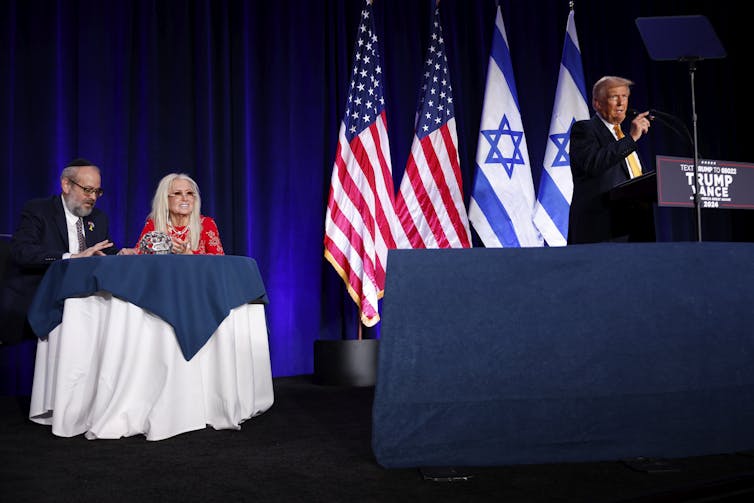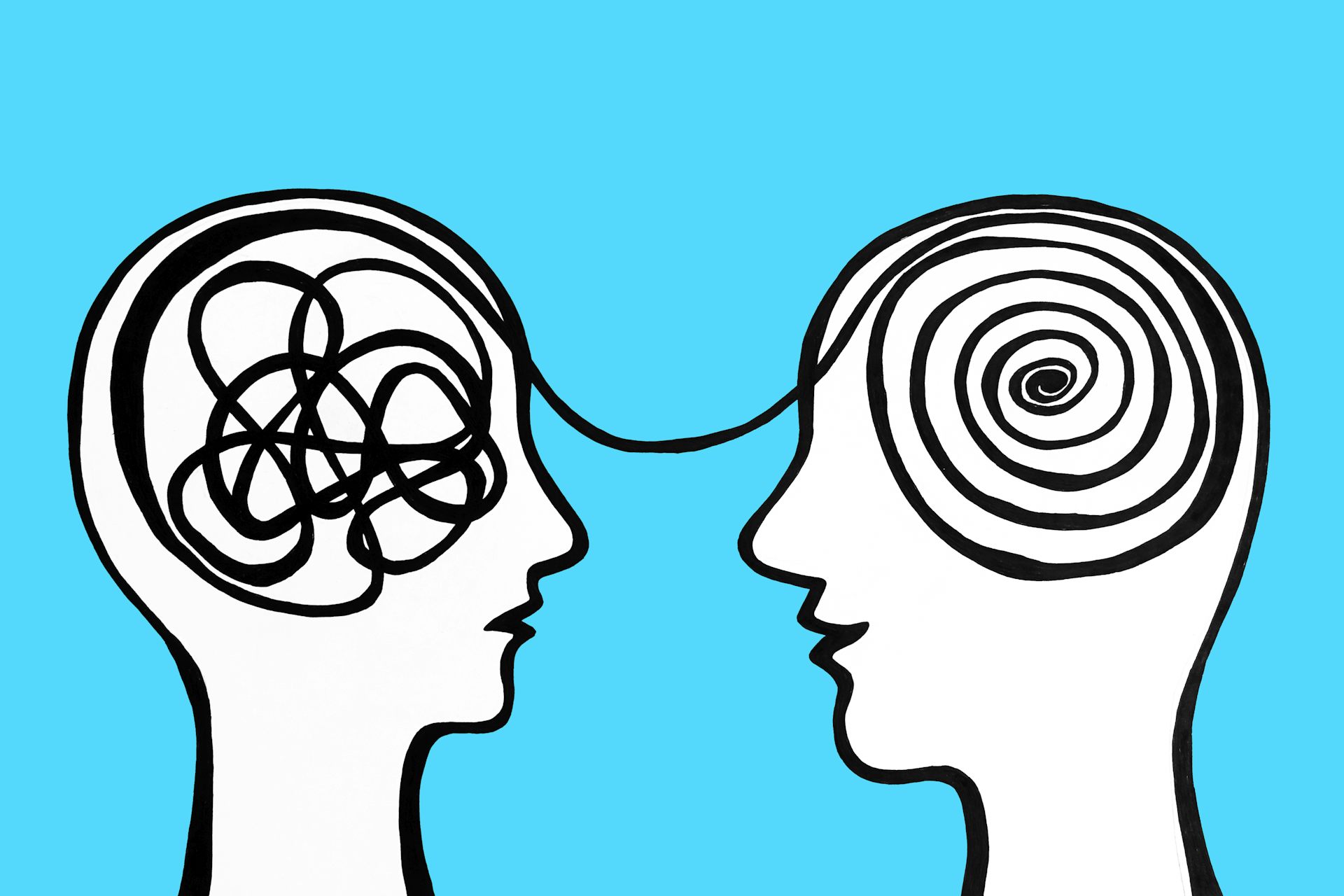Reducing American antisemitism requires more than condemning opposition to Israel and targeting elit
The Trump administration’s crusade against antisemitism looks to be mainly about crippling elite universities and blurring the lines between pro-Palestinian activism and antisemitism.

Violent antisemitism in the U.S. isn’t limited to the far right wing of the political spectrum. This was tragically obvious in two recent events – the June 1, 2025, attack using Molotov cocktails to burn participants in a Boulder, Colorado, march supporting Israeli hostages in Gaza, and the murders of two Israeli embassy staffers, an American Jew and an Israeli, on May 21, 2025, outside the Capital Jewish Museum in Washington, D.C.
As an expert on the Middle East, including Israel, my research and administrative work have included contributing to a global effort to define antisemitism and addressing antisemitism on my own campus.
Antisemitism can be defined simply as “discrimination, prejudice, hostility or violence against Jews as Jews (or Jewish institutions as Jewish).” What actually constitutes it is more contested, especially with respect to links between Jews and the state of Israel.
President Donald Trump claims he is taking “unprecedented” steps to combat antisemitism.
American Jews perceive antisemitism as rising since 2016, largely because, as one study put it, “people who hold anti-Semitic views now feel more free to express them.” But the current federal fight against antisemitism in the U.S. may have more to do with the agendas of members of the American and Israeli governments than with the concerns of most American Jews.
First, the Trump administration’s attacks on antisemitism center on elite universities, where the president claims antisemitism runs rampant. Second, the current Israeli government tries to blur the lines between pro-Palestinian activism and antisemitism.
These factors polarize and complicate the landscape for combating antisemitism effectively.

Targeting speech at universities by charging ‘antisemitism’
Trump’s administration has taken dramatic actions in the name of curbing antisemitism. Yet, his policies are notable for what they ignore as well as what they target.
Right-wing antisemitism was responsible for the deadliest attack on a Jewish community in U.S. history in Pittsburgh in 2018. Yet the administration’s model for fighting antisemitism is not based in fighting white supremacist hatred toward Jews, which relates back to the Nazis in Germany.
In fact, members of Trump’s administration, including senior adviser Stephen Miller and former Department of Government Efficiency chief Elon Musk, have supported white supremacist ideas or groups. Trump’s own words have evoked right-wing antisemitic tropes, such as assuming American Jews are loyal to Israel or adept at making money.
Trump administration policies on antisemitism are most vocal around punishing leading American universities as unsafe for Jews. As the leading target of the president’s ire, Harvard University has acknowledged that some activism against Israel’s war with Hamas in Gaza has contributed to antisemitism on campuses.
However, federal actions targeting Harvard ostensibly seek to punish antisemitism by demanding sweeping federal oversight of Harvard’s curriculum and self-governance. Billions of dollars in research funds have been cut. Neither action connects clearly to Harvard’s patterns or policies around antisemitism.
Given this, Harvard sued the government in April.
Many American Jews believe that Trump’s true purpose is to use the antisemitism issue as one means to curb free expression at universities.
Defending Israeli policy by charging ‘antisemitism’
National governments naturally seek political and material support from powerful allies. Israel’s efforts to encourage Americans to champion that support fit this pattern.
Israel receives more U.S. aid than any other country. Thus, its government has an interest in enlisting diverse people and organizations in a sustained way to support its policies.
The Israeli intervention has grown because Prime Minister Benjamin Netanyahu’s far-right government is unpopular in both Israel and the U.S. Its war in Gaza, provoked by Hamas, is highly destructive and globally unpopular.
Most experts and policymakers now argue that Israel, along with Hamas, has committed international war crimes.
The Israeli government recently increased its funding to US$150 million for global public relations efforts. This is a major acceleration of policies that Israeli has pursued for decades known in Hebrew as “hasbara,” which translates to “explanation.”
Documenting specific links between Israel’s government and groups promoting its agenda in the U.S. can be difficult. This may be a deliberate strategy by Israeli leaders to conceal their efforts.
Yet, mainstream Israeli-run organizations such as the Jewish Agency have played up links between pro-Palestinian activism and antisemitism since Hamas triggered the war in Gaza. Groups whose funding and leadership are hard to trace maintain public blacklists labeling vocal pro-Palestine activists as antisemites. Those lists have been used by Israeli government bureaucrats to bar visitors to the country.
U.S.-based groups aligned with Israeli government messaging engage in persistent strategies to discredit opposition voices. Some attack publicly vocal activists, including some American Jews. Others press organizations, political bodies and institutions to adopt a definition of antisemitism that makes it easy to conflate criticism of Israeli policy with antisemitism.
Anti-Israel behavior in the U.S. can be antisemitic, such as asserting that American Jews, because they are Jews, are responsible for Israeli state actions. And some American Jews support crackdowns on pro-Palestinian activists.
However, characterizing antisemitism in the U.S. mostly in terms of speech and activism against the Israeli government augments the Trump administration’s neglect of dangerous right-wing antisemitism.

Polarization and antisemitism in the US
Taken together, the politics pursued by Trump and the Netanyahu government combine to target legally protected speech in the U.S. more than they deter antisemitism.
By contributing to polarization, the conflation of antisemitism with a wide range of speech critical of Israel could add to threats faced by Jews and other religious minorities. Those who wish to undermine work toward Palestinian-Israeli coexistence benefit from the charge that most pro-Palestinian activists are antisemitic. This worsens already visible divides among American Jews over how Israel’s mistreatment of Palestinians squares with their Jewish identities.
Supported by the most aggressive pro-Netanyahu groups, the Trump administration links concerns against antisemitism to efforts to deport immigrants who have expressed pro-Palestine views, such as Tufts doctoral student Rümeysa Öztürk. Deporting people in the name of policing speech critical of Israel also runs a risk that Jews will be blamed for government actions many Americans find objectionable.
Let’s be clear. Some pro-Palestinian activism embraces Jew-hatred, as the attacks in Washington and Boulder highlight. But lumping together as antisemitic most pro-Palestinian speech, as current American and Israeli leaders do, complicates seeing antisemitism clearly and countering it.
In addition, most Americans – and Israelis – seek an end to the war, mounting deaths and humanitarian disaster in Gaza. Any potential to blur this with antisemitism augments the few, loud American voices that support one side in the conflict by dehumanizing the other side.
Americans believe other minority groups face greater discrimination than Jews. Yet, antisemitism from diverse directions is the worst I have seen in my lifetime.
As with any policy problem, the way to deal with this issue is to focus on all facets of the problem, including right-wing racism and Christian nationalism.
Current national politics around antisemitism may serve many purposes. Yet most American Jews doubt that these policies actually protect them.
David Mednicoff does not work for, consult, own shares in or receive funding from any company or organization that would benefit from this article, and has disclosed no relevant affiliations beyond their academic appointment.
Read These Next
After a 32-hour shift in Pittsburgh, I realized EMTs should be napping on the job
A paramedic and university professor shares data about how strategic napping could help his own health…
Trump administration axed nutrition education program that saved more money than it cost, even as go
Every dollar spent on community health education through SNAP-ED saved an estimated $10.64 in Medicaid…
Menstrual pads and tampons can contain toxic substances – here’s what to know about this emerging he
Heavy metals, phthalates and other potentially harmful chemicals have been detected in a range of menstrual…






